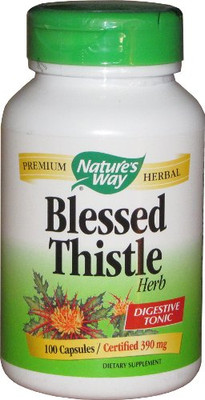Blessed Thistle was widely used in Europe during the middle ages for numerous health purposes. Today, scientific studies on the Blessed Thistle herb reveals that it contains active ingredients called tannins that support proper digestion and women’s health. Blessed thistle actively soothes the digestive system and helps mothers produce the right amount of milk for their infants.
Supplement Facts
Serving Size: 2 Capsules
Servings Per Container: 50
|
|
Amount Per Serving |
% Daily Value |
|
Organic Blessed Thistle (stem, leaf, flower) |
780 mg |
† |
† Daily Value not established.
Other Ingredients: Gelatin (capsule).
Suggested Use
Take 2 capsules three times daily, preferably with food.
Precautions
Not for use during pregnancy.
- Blessed Thistle helps stimulate healthy production of gastric acid for proper digestion. Thus, it is used for soothing common digestive discomforts due to indigestion like constipation and flatulence.
- Blessed thistle is also used to stimulate the flow of bile. Bile is the fluid released by the liver that carries waste products and breaks down fats during digestion.
- Blessed thistle supplements together with fenugreek can help women who are struggling with milk production to feed their infants. Women who took Blessed thistle and fenugreek reported significant improvement in breast milk quantity and quality that they produce. According to scientists, Blessed thistle and fenugreek both contain hormones that stimulate natural milk production in lactating mothers.
- Blessed thistle possesses astringent properties. The astringent qualities of blessed thistle are thought to slow down or prevent bleeding. Because of this, blessed thistle is used in the formulation of natural remedies for cuts and wounds. It also works by purifying the blood and promoting health in yeast infections.
- Experts believe that blessed thistle supports the body’s natural defences against bacteria and inflammation. This herb contains bitter terpenoid lactones, which according to research, possess natural antibacterial activities. The flavonoids in Blessed thistle help the body generate healthy responses to inflammation.
Blessed Thistle (Cnicus benedictus) also known as ghost thistle or holy thistle is a flowery herb that typically grows in the Mediterranean region. This member of the Asteraceae family features yellow flowers with hairy stems and sharp leaves. Although different parts of the plant are used as medicine, the flowery tops are more commonly used. The benefits of Blessed Thistle were first known in Europe in the middle ages, where it is used as tonics by monks. Today, Blessed thistle is widely studied for its usefulness in soothing digestive discomforts, promoting health milk production in lactating mothers, and supporting the body to develop healthy responses to inflammation and infection. The health benefits of blessed thistle are associated with the bitter substances in the herb known a sesquiterpene lacton of the germacrane type, with cnicin, and also astemisiifolin and soloniternolide. Other beneficial compounds found in Blessed thistle include flavonoids, triterpenes, polyacetylenes, and volatile oil with citronellol, p-cymene, cuminal, as well as benzaldehyde and cinnamaldehyde.



